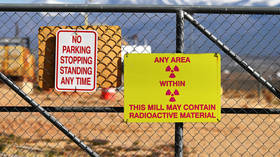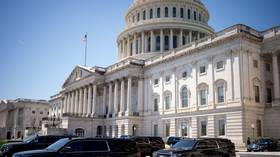Biden approves ban on Russian uranium

US President Joe Biden has signed into law a bill banning imports of Russian enriched uranium, despite warnings that the move could backfire on the American economy. Russia has remained America’s top foreign source of the crucial nuclear fuel, even amid tensions over the Ukraine conflict.
Biden signed the bipartisan legislation on Monday. National Security Adviser Jake Sullivan claimed it would “strengthen our nation’s energy and economic security by reducing – and ultimately eliminating – our reliance on Russia for civilian nuclear power.”
The measure, which was unanimously passed by the Senate in late April, will go into effect in about 90 days. However, the US Department of Energy can issue waivers until 2028 in cases where there is no alternative to Russian low-enriched uranium or if its shipments are in the national interest. The ban also provides some $2.7 billion in federal funding to build new enrichment capacity in America to boost its civilian nuclear industry.
Russian ambassador to the US, Anatoly Antonov, condemned the ban, accusing Washington of persisting in “its stillborn policy of inflicting [a] strategic economic defeat on us.” “The current attack – not only on Russia, but also on the world market for uranium fuel used in nuclear power plants – leads to new shocks in international economic relations,” the envoy said, warning that the move would boomerang.
“The financial losses for the United States will be much greater than for Russia,” Antonov added. He also argued that US sanctions are failing to undercut Russia. “Reality has shown that the Russian economy is ready for any challenges and quickly responds to emerging difficulties, even extracting dividends from the situation.”
As of 2022, Russia was the largest enriched uranium exporter on the global market, with an estimated export value of $2 billion. According to US Energy Department data, it accounts for about a quarter of the uranium used in US reactors.
Against this backdrop, Bloomberg has reported that the ban “carries risks.” Jonathan Hinze, president of nuclear fuel market research firm UxC, told the outlet that the legislation could lead to a 20% hike in uranium prices.
In December, Bloomberg cited sources as saying that Tenex, a Russian overseas trading company owned by Russian state corporation Rosatom, had warned its American customers that Moscow could preemptively bar nuclear fuel exports to the US if a uranium ban were approved.
However, at the time Rosatom dismissed the report as “inaccurate,” insisting that Tenex “is fulfilling all of its contractual obligations and will continue to do so.”













